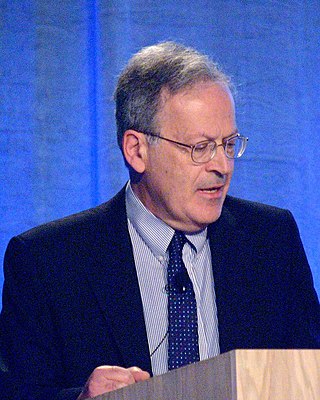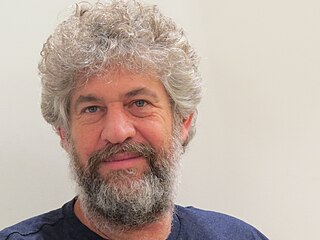Related Research Articles

Stephen Arthur Cook is an American-Canadian computer scientist and mathematician who has made significant contributions to the fields of complexity theory and proof complexity. He is a university professor emeritus at the University of Toronto, Department of Computer Science and Department of Mathematics.
The Gödel Prize is an annual prize for outstanding papers in the area of theoretical computer science, given jointly by the European Association for Theoretical Computer Science (EATCS) and the Association for Computing Machinery Special Interest Group on Algorithms and Computational Theory. The award is named in honor of Kurt Gödel. Gödel's connection to theoretical computer science is that he was the first to mention the "P versus NP" question, in a 1956 letter to John von Neumann in which Gödel asked whether a certain NP-complete problem could be solved in quadratic or linear time.
The graph isomorphism problem is the computational problem of determining whether two finite graphs are isomorphic.
In computational complexity theory, the unique games conjecture is a conjecture made by Subhash Khot in 2002. The conjecture postulates that the problem of determining the approximate value of a certain type of game, known as a unique game, has NP-hard computational complexity. It has broad applications in the theory of hardness of approximation. If the unique games conjecture is true and P ≠ NP, then for many important problems it is not only impossible to get an exact solution in polynomial time, but also impossible to get a good polynomial-time approximation. The problems for which such an inapproximability result would hold include constraint satisfaction problems, which crop up in a wide variety of disciplines.

Leslie Gabriel Valiant is a British American computer scientist and computational theorist. He was born to a chemical engineer father and a translator mother. He is currently the T. Jefferson Coolidge Professor of Computer Science and Applied Mathematics at Harvard University. Valiant was awarded the Turing Award in 2010, having been described by the A.C.M. as a heroic figure in theoretical computer science and a role model for his courage and creativity in addressing some of the deepest unsolved problems in science; in particular for his "striking combination of depth and breadth".
ACM SIGACT or SIGACT is the Association for Computing Machinery Special Interest Group on Algorithms and Computation Theory, whose purpose is support of research in theoretical computer science. It was founded in 1968 by Patrick C. Fischer.

The Donald E. Knuth Prize is a prize for outstanding contributions to the foundations of computer science, named after the American computer scientist Donald E. Knuth.
Umesh Virkumar Vazirani is an Indian–American academic who is the Roger A. Strauch Professor of Electrical Engineering and Computer Science at the University of California, Berkeley, and the director of the Berkeley Quantum Computation Center. His research interests lie primarily in quantum computing. He is also a co-author of a textbook on algorithms.
Algorithmic game theory (AGT) is an area in the intersection of game theory and computer science, with the objective of understanding and design of algorithms in strategic environments.
Frances Foong Chu Yao is a Taiwanese-American mathematician and theoretical computer scientist. She is currently a Chair Professor at the Institute for Interdisciplinary Information Sciences (IIIS) of Tsinghua University. She was Chair Professor and Head of the Department of computer science at the City University of Hong Kong, where she is now an honorary professor.
The ACM Symposium on Principles of Distributed Computing (PODC) is an academic conference in the field of distributed computing organised annually by the Association for Computing Machinery.
The IEEE Annual Symposium on Foundations of Computer Science (FOCS) is an academic conference in the field of theoretical computer science. FOCS is sponsored by the IEEE Computer Society.

Ran Raz is a computer scientist who works in the area of computational complexity theory. He was a professor in the faculty of mathematics and computer science at the Weizmann Institute. He is now a professor of computer science at Princeton University.
Ashok K. Chandra was a computer scientist at Microsoft Research in Mountain View, California, United States, where he was a general manager at the Internet Services Research Center. Chandra received his PhD in Computer Science from Stanford University, an MS from University of California, Berkeley, and a BTech from IIT Kanpur. He was previously Director of Database and Distributed Systems at IBM Almaden Research Center.
Amos Fiat is an Israeli computer scientist, a professor of computer science at Tel Aviv University. He is known for his work in cryptography, online algorithms, and algorithmic game theory.

Noam Nisan is an Israeli computer scientist, a professor of computer science at the Hebrew University of Jerusalem. He is known for his research in computational complexity theory and algorithmic game theory.
Timothy Avelin Roughgarden is an American computer scientist and a professor of Computer Science at Columbia University. Roughgarden's work deals primarily with game theoretic questions in computer science.
Katrina Ligett is an American computer scientist. She is Associate Professor of computer science and economics at the Hebrew University and Visiting Associate at California Institute of Technology. She is known for work on algorithmic game theory and privacy.
Benjamin E. Rossman is an American mathematician and theoretical computer scientist, specializing in computational complexity theory. He is currently an associate professor of computer science and mathematics at Duke University.
Prasad Raghavendra is an Indian-American theoretical computer scientist and mathematician, working in optimization, complexity theory, approximation algorithms, hardness of approximation and statistics. He is a professor of computer science at the University of California at Berkeley.
References
- Cook, Stephen (1971), "The complexity of theorem proving procedures" (PDF), Proc. STOC 1971, pp. 151–158, doi: 10.1145/800157.805047 , S2CID 7573663 .
- Fich, Faith (1996), "Infrastructure issues related to theory of computing research", ACM Computing Surveys , 28 (4es): 217–es, doi:10.1145/242224.242502, S2CID 195706843 .
- Johnson, D. S. (1984), "The genealogy of theoretical computer science: a preliminary report", ACM SIGACT News , 16 (2): 36–49, doi:10.1145/1008959.1008960, S2CID 26789249 .